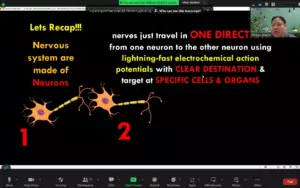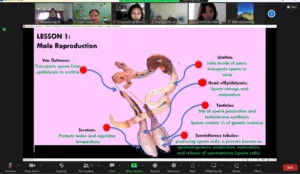 Dr. Mohd Noor Hisham Mohd Nadzir from the Department of Biology, Faculty of Science, Universiti Putra Malaysia, returned to give a guest lecture on Animal Physiology (20/9). With the theme “Endocrinology & Reproductive Physiology of Beef Cattle,” the guest lecture was attended by students of the Animal Physiology course, Department of Biology, Faculty of Mathematics and Natural Sciences, University of Jember online. At the beginning of the material, Dr. Noor Hisham introduced endocrinology. “Endocrinology is the study of hormones, and hormones are very important for daily survival as chemical messengers that move from one cell to another,” he explained. This guest lecture was moderated by Purwatiningsih, S.Si., M.Si., Ph.D.
Dr. Mohd Noor Hisham Mohd Nadzir from the Department of Biology, Faculty of Science, Universiti Putra Malaysia, returned to give a guest lecture on Animal Physiology (20/9). With the theme “Endocrinology & Reproductive Physiology of Beef Cattle,” the guest lecture was attended by students of the Animal Physiology course, Department of Biology, Faculty of Mathematics and Natural Sciences, University of Jember online. At the beginning of the material, Dr. Noor Hisham introduced endocrinology. “Endocrinology is the study of hormones, and hormones are very important for daily survival as chemical messengers that move from one cell to another,” he explained. This guest lecture was moderated by Purwatiningsih, S.Si., M.Si., Ph.D.
It is said that scientifically, hormones communicate this effect through their unique chemical structure, which is recognized by specific receptors on their target cells. “Hormones will tell us or animals how to control various physiological activities, such as growth, development, puberty, alertness levels, sugar and appetite regulation, bone growth, and stress,” he explained. In short, hormones influence aspects of our daily lives to ensure that the body maintains the balance necessary for health and survival.
Dr. Noor Hisham also presented the endocrinology and physiology of beef cattle. Reproductive efficiency is very important in beef cattle production because it has a direct impact on livestock numbers and profitability. “Understanding the biological mechanisms related to breeding cows or heifers is an important management tool. The endocrine system plays a role in regulating the reproductive process, including the estrus cycle, ovulation, pregnancy, and the birthing process,” he said.
This Queensland Doctoral alumnus, Australia, explained how reproduction occurs in bulls and cows. Assisted Reproductive Technology (ART), or assisted technology for reproduction that is carried out on farms and brought to the laboratory, was also mentioned. Among them is estrus synchronization, which is the process of coordinating a group of female animals so that they have the same estrus (heat) onset time and inducing the production of many mature eggs from the ovaries using drugs.
It was also conveyed that several factors that affect reproduction are nutrition, stress, health and disease, insemination time and technique, and no less influential, the vaccination program and overall livestock health management contribute to reproductive success. “It is concluded that understanding the endocrine and reproductive physiology of beef cattle will optimize livestock productivity. Proper management of nutrition, health, and breeding practices can increase reproductive efficiency and overall beef cattle production profitability,” he concluded.
 |
 |
 |
 |
